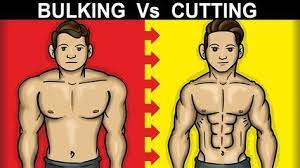Cutting and Bulking in the Gym:
Can it Lead to Disordered Eating?

https://www.pinterest.com/pin/709457747525289561/
February 15, 2022
If you are familiar with the gym setting, there is huge talk around cutting, bulking and what it can do for the body. Bulking is known as eating more calories than you need, which people call eating in a calorie surplus. In a calorie surplus, individuals perform resistance training in order to gain muscle. Cutting is known as eating fewer calories than you need and that you burn, also known as eating in a calorie deficit. When in a calorie deficit, individuals may focus more on performing cardio in order to slim down and look more lean and shredded. However, this has brought much attention from many about the unhealthy effects it may have on your body. In the world, eating too much or too little is classified as an eating disorder, but if it is in the gym does it make it better? Or is it still considered disordered eating?
Classifications of Eating Disorders
The American Psychiatric Association states that “Eating disorders are behavioral conditions characterized by severe and persistent disturbance in eating behaviors and associated distressing thoughts and emotions. They can be very serious conditions affecting physical, psychological and social function.” Any drastic changes in a person’s eating habits and behaviors, can be seen as a form of disordered eating. Therefore cutting and bulking in the gym can be seen as disordered eating. Cutting and bulking can show individuals everywhere that lowering and raising your calorie intake for the sole purpose of changing your body is okay, while this is considered disordered eating. Can these eating habits in the gym potentially lead to full blown eating disorders?
Showing signs
Studies show that most young men with eating disorders are simply trying to build muscle and not to lose weight. Much of research on eating disorders are naturally pointed more towards women, however in recent years researchers increasingly studied ways that body image can affect the mind of a man. Throughout history women with eating disorders are trying to achieve thinness, while men strive for a lean and muscular body; both trying to achieve what society tells them how their body has to be in order to be “perfect.” In an effort to build muscle many teenage boys and young men have engaged in activities that can be detrimental to their health. In a new study recently published in the International Journal of Eating Disorders, they state that a whopping 22% of men between the ages of 18 and 24 have experienced and participated in what many call muscularity-oriented disordered eating behaviors. This specific type of disordered eating can develop when a man becomes preoccupied with his appearance, body size, weight, food, or exercise in an over obsessive way that can lead to a worse quality of life. Dr. Jason Nagata who is the lead author of this study states “In moderation, some behaviors to build muscle or bulk up may not be ‘disordered,’” he continued. “However, engaging in muscle-building or bulking behaviors may put young people at greater risk for developing an eating disorder or muscle dysmorphia.”
It is estimated that between 20 and 50% of females with eating disorders engage in excessive exercise. Studies also show that eating disorders of gym goers tend to be higher than that among people who participate in either a non-competitive or competitive sport. Many curious professionals decided to test this theory that the gym can cause disordered eating and activities that individuals perform at the gym, whether that be excessive exercise or eating habits can lead to disordered eating. One study states that 10.9% of their sample of fitness clients of both genders met the criteria as having an eating disorder, calculated by the Eating Disorders Examination-Questionnaire. There are often occurrences in about 35 and 15% of binge eating or dietary restraint of male fitness goers. Another study states that about 57% of their sample fitness clients fulfilled a diagnostic of mental disorders, which is a criteria for a type of eating disorder called bulimia.
Sufferers of both eating disorders and people who participate in excessive exercise can often display signs and behaviors of disorders which oftentimes can be seen as unhealthy and can potentially turn into something more severe to observers. Furthermore we can see that participating in some of these gym activities such as cutting and bulking, along with excessive exercise can heavily start unhealthy habits dealing with food, and can potentially continue these habits into eating disorders and disordered eating. If you do take part in any of these activities it is highly important to keep your mental health in check as poor mental health surrounding body image can also lead to eating disorders and an increase in unhealthy habits. If you or a loved one is struggling with disordered eating, please reach out and get help, one way you can get help is through online courses, such as this eating disorder helpline listed below. https://www.nationaleatingdisorders.org/help-support/contact-helpline


